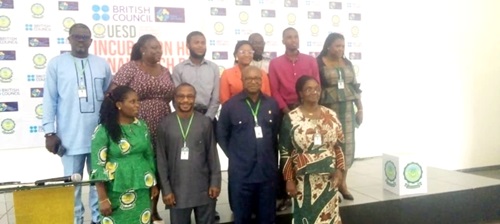The Biogel Farm Technology Group has been adjudged the best of an Innovation Incubation Hub Final Pitch Day programme by the University of Environment and Sustainable Development (UESD) at Somanya in the Yilo Krobo Municipality in the Eastern Region.
The group was chosen as the best out of the eight groups that participated in the programme sponsored by the British Council.
The other seven competitors were PPC Acqua Feed, Mango Processing, Ata Compost, Mac Eco Pac, Juice House, Bridging the Gap and Campus Ride, which placed second, third, fourth, fifth, sixth and seventh, respectively. For their prize, the Biogel Farm Technology group, represented by Jonathan Nyarko, Lawal Mohammed and Innocentia Denyo, will represent the UESD in further competitions with other universities in Accra, later this year.
They also received a cash prize of GH¢4,000, while the first and second runners-up received GH¢1,500 and GH¢1,200 respectively.
Background
Universities and technical institutions in Ghana play a crucial role in fostering entrepreneurship by providing training, mentorship and infrastructure support for startups and innovators.
There is, however, a mismatch between academic training and industry needs, requiring hubs to provide supplementary training in critical areas.
Through collaboration and networking between hubs, industries and policy makers, universities seek to establish stronger relationships with industries to offer practical learning opportunities, internships and collaborative research to foster innovation and ensure that startups have access to resources, mentorship and market opportunities.
It is for this reason that the Tertiary Hubs for Innovation and Knowledge (THINK) Network was set up with its Headquarters at the University of Ghana Business School (UGBS Nest).
Entrepreneurship in higher education
The acting Head of Research, Innovation and Consultancy Unit Coordinator of the UESD THINK Network, Dr Felicia Annin, in her opening remarks at the programme, said in October last year, the UGBS Nest hosted the THINK Network Programme which marked a pivotal moment in the effort to cultivate a dynamic entrepreneurship ecosystem within Higher Education Institutions (HEIs) in Ghana.
‘’The THINK Network Induction Programme brought together a diverse group of stakeholders from the education and entrepreneurship sectors.
This collaborative environment fostered discussions around strengthening the entrepreneurial capabilities of Universities in Ghana to align educational institutions with the needs of the broader innovation landscape,’’ she stressed.
Dr Annin noted that as part of its ongoing commitment to fostering entrepreneurship within Ghana’s HEIs, the British Council, through THINK Network, awarded grants to four institutions to support student-driven entrepreneurship by providing essential resources, mentorship and funding with each institution receiving $4,000 to support the establishment of innovation hubs on their campuses.
The hubs, she said, were designed to nurture entrepreneurial activities and assist students/innovators to transform their innovative ideas into sustainable businesses.
Transform ideas
The Vice-Chancellor of UESD, Prof. Eric Nyarko-Sampson, in his closing remarks, said that as one of the beneficiaries of this initiative, the UESD Innovation Hub served as an incubator for student-led ventures, focusing on providing hands-on support for early-stage ideas.
‘’Through this initiative, students will develop concepts into sustainable business ventures, contributing to the wider goal of enhancing entrepreneurship and innovation capacity in Ghana.
“The hub acts as a platform for students to transform their ideas into meaningful solutions and work towards achieving the university’s vision, mission and the HOPE core values,’’ Prof. Nyarko-Sampson indicated.
A representative from the British Council, who doubled as the Mentor for the Innovation Hubs in Ghana, Obed Opoku Twum, in his brief remarks, lauded the students for the good presentations.
He said young people had to change their future within the next 10 years through the Innovative programme and urged them to do more going forward.

